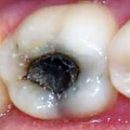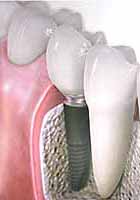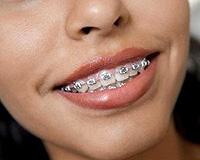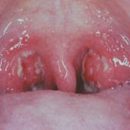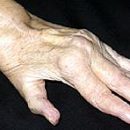What are the reasons for gingivitis in children? How is the treatment of gingivitis in children? Answers to these questions you will find in the article.
Content
Gingivitis, reasons for gingivitis in children
Gingivitis is the inflammation of the mucous membrane of the gums and interdental papillas. Gingivitis may occur at any age and from different reasons. Inflammation of toothpods can only be about one or more teeth, or capture all interdental nipples and gums. Characteristic signs of gingivitis are redness of the gums and their bleeding when cleaning the teeth and the reception of solid food, for example, when emphasising apple. With long-term inflammation of the gum mucosa, inflammation can spread to bone tissue.
 Inflammation of gums, bundles of the tooth and bone well received the name of periodontitis. In periodontitis, the mobility of the teeth is marked. In periodontal disease, the teeth can also be mobile, but it happens in the elderly and is associated with age-related dystrophic decrease in jaws in size. Fortunately, the children of periodontalism do not happen, and periodontitis meets not often. But the gingivities are found very often, especially in adolescents in the period of enhanced growth.
Inflammation of gums, bundles of the tooth and bone well received the name of periodontitis. In periodontitis, the mobility of the teeth is marked. In periodontal disease, the teeth can also be mobile, but it happens in the elderly and is associated with age-related dystrophic decrease in jaws in size. Fortunately, the children of periodontalism do not happen, and periodontitis meets not often. But the gingivities are found very often, especially in adolescents in the period of enhanced growth.
The causes of gingivitis can be: the crowded position of the teeth, the bite anomalies with the underload or overload of the teeth, the lack of vitamin C, the dysbacteriosis of the oral cavity, hormonal dysfunction, the reception of some medicines, the insufficient amount of saliva - xerostomy, diseases of the blood-forming organs, and a packer disease during meals, jam food between teeth, the presence of carious cavities on the side surfaces of the teeth, hanging the edges of the seal and t. D.
With gingivitis there is always a lot of dental plates, which requires a particularly thorough observance of the oral cavity hygiene. By itself, bad oral hygiene can also be the cause of gingivitis, and then the cleaning of the teeth is eliminating the gum inflammation within a month. If this did not happen, you need to look for another reason.
Gingivitis can be sharp and chronic. Acute gingivitis in children can develop with acute infectious diseases. Then doctors recommend painkillers and anti-inflammatory drugs for processing the oral mucosa. The most common form of the inflammation of the gum is chronic catarrhal gingivitis, which is accompanied by redness and swelling of the gum mucosa and interdental papillars. Interdental nipples scatter and often bleed. Compliance with the rules of hygiene and rinsing of the oral cavity with informies and champs of grasses improve the state of the gums, but often it is not enough, then doctors prescribe special antiseptic rinsing, treatment of the oral mucosa with special gels and be sure - multivitamins to improve metabolism in the body. Often this happens not enough, then other reasons are consistently excluded.
Treatment of gingivitis in children
If a teenager catarrhal gingivitis is usually recommended: to regularly brush the teeth with soft toothbrushes and make the gum massage using pastes containing extracts of medicinal plants and antiseptics: «New pearl extras», «Forest», «New pearl Thotal», «Laculate», «Colgate Total», «Aqua-Fresh», «Blend-A-Med Complete», «Parodontax» and etc.
On the recommendation of the doctor, you can rinse your mouth with champions and influences: chamomile, sage, hunting, nettle, birch, mint, oak bark, green tea.
Under the control of the doctor can be applied: collection «Eleksol» (chamomile, licorice, sage, eucalyptus, marigold, series); Alcohol solution «Rotokan» (chamomile, yarrow, calendula); solution «Tantuum Verde» (benzidamine hydrochloride); solution «Corsodil» (2% chlorhexidine solution).
When using these funds, it is necessary to strictly comply with the recommendations of the application.
Chronic hypertrophic gingivitis - a special form of gingivitis. It can develop in children and adolescents against the background of hormonal shifts, as well as those who take anti-epileptic drugs. With hypertrophic gingivities, intersubolic nipples increase due to excess reduction of the gum mucosa, sometimes it even partially closes his teeth. Between the bug, enlarged papillas and teeth accumulates the flare and the remains of food, which supports inflammation. Hypertrophic gingivitis of adolescents got the name of youth gingivitis. At the same time, the gum inflammation is usually not required medical interventions, but the consultation of the dentist is necessary.
The most severe form of inflammation of the gum is necrotic gingivitis. It develops with a sharp decrease in immunity in severely sick people. Panish-necrotic gingivitis often accompanies blood diseases, necrotic gingivitis during leukemates occurs. Treatment of such gingivitis complex: treatment with anti-inflammatory means - antiseptics and enzymes, the use of painkillers and means promoting healing. Treatment is carried out by appointment and under the control of the doctor.

